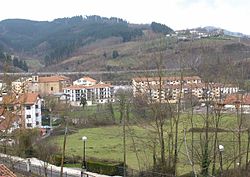Ormaiztegi | |
|---|---|
 | |
| Coordinates: 43°2′35″N2°15′18″W / 43.04306°N 2.25500°W | |
| Country | Spain |
| Autonomous community | |
| Province | Gipuzkoa |
| Eskualdea | Goierri |
| Government | |
| • Mayor | Jon Miren Intxausti Ugalde |
| Area | |
• Total | 6.77 km2 (2.61 sq mi) |
| Elevation | 200 m (700 ft) |
| Population (2018) [1] | |
• Total | 1,302 |
| • Density | 190/km2 (500/sq mi) |
| Demonym | Ormaiztegiar |
| Time zone | UTC+1 (CET) |
| • Summer (DST) | UTC+2 (CEST) |
| Postal code | 20216 |
| Official language(s) | Basque, Spanish |
| Website | Official website |
Ormaiztegi is a town and municipality located in the comarca of Goierri, Gipuzkoa province, in the autonomous community of the Basque Country, northern Spain. It is also the location of the historical monument, Viaduc d'Ormaiztegi. It is the birthplace of the Carlist hero General Tomas Zumalacarregui.
It also has Irizar's main factory.


